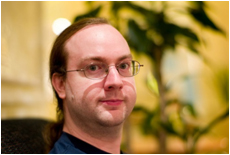
Roger Dingledine -
The Tor Project
Abstract
Tor is a free-software anonymizing network that helps people around the world use the Internet in safety. Tor's 5500 volunteer relays carry traffic for around a million daily users, including ordinary citizens who want protection from identity theft and prying corporations, corporations who want to look at a competitor's website in private, people around the world whose Internet connections are censored, and even governments and law enforcement.
The last year has included major cryptographic upgrades in the Tor software, dozens of research papers on attacking and improving the Tor design, mainstream press about government attempts to attack the Tor network, discussions about funding, FBI/NSA exploitation of Tor Browser users, botnet related load on the Tor network, and other important topics.
In this talk I'll aim to strike a balance between explaining Tor's "intellectual merit" side (all the neat research problems that Tor raises, and how we've positioned ourselves to get so much attention from academics) and Tor's "broader impact" side (the many ways that Tor has changed lives around the world).
Speaker
Roger Dingledine is project leader and research director for The Tor Project, a US non-profit working on anonymity research and development. While at MIT he developed Free Haven, one of the early peer-to-peer systems that emphasized resource management while maintaining anonymity for its users. He works with the Electronic Frontier Foundation, the US Navy, Voice of America, the National Science Foundation, and other organizations to design and develop systems for anonymity, traffic analysis resistance, and censorship resistance. He organizes academic conferences on anonymity, speaks at such events as Blackhat, Defcon, Toorcon, and the CCC congresses, and also does tutorials on anonymity for national and foreign law enforcement. Roger was honored in 2006 as one of the top 35 innovators under the age of 35 by Technology Review magazine, and honored in 2012 by Foreign Policy magazine as one of the 100 top global thinkers.
About the WATCH series:
Transforming today's trusted but untrustworthy cyberinfrastructure into one that can meet society's growing demands requires both technical advances and improved understanding of how people and organizations of many backgrounds perceive, decide to adopt, and actually use technology. WATCH aims to provide thought-provoking talks by innovative thinkers with ideas that illuminate these challenges and provide signposts toward solutions. The series is jointly organized by NSF's Computer Science and Engineering (CISE) and Social, Behavioral, and Economic (SBE) Directorates and sponsored by the CISE Secure and Trustworthy Cyberspace (SaTC) Program. Talks will be recorded and made available over the Internet.
For technical questions during the webcast contact [email protected] or call one of our technical support numbers to the right. |
For the webcast, please tune in 15 minutes prior to the start time for the event and test your video player. This live event will be captioned in compliance with Section 508. The event will be archived for 3 months - viewable at http://www.tvworldwide.com/events/nsf/130926 and http://www.fededtv.com/. Participants should have the Windows Media Player or Flash player installed to view the event. (links to the webcast are in the upper-right corner of this page) |
About NSF
The National Science Foundation (NSF) is an independent federal agency that supports fundamental research and education across all fields of science and engineering. In fiscal year (FY) 2009, its budget is $9.5 billion, which includes $3.0 billion provided through the American Recovery and Reinvestment Act. NSF funds reach all 50 states through grants to over 1,900 universities and institutions. Each year, NSF receives about 44,400 competitive requests for funding, and makes over 11,500 new funding awards.MORE
Founded in 1999, TV Worldwide (www.tvworldwide.com) developed the first Internet TV network of community-based Internet TV channels, primarily targeting niche professional communities ranging from the Maritime industry to the Digital Media sector. Known by many in the industry as "Internet TV for Smart People", Fortune 500 companies, 18 federal government agencies, and numerous International associations including the National Association of Broadcasters, utilize TV Worldwide's live and archived state-of-the art video streaming content applications and Internet TV channels. In recognition of the company's unique achievements in new media, TV Worldwide was selected by the National Academy of Television Arts and Sciences (NATAS) to webcast the Daytime Emmy Awards and the Emmy awards for Technology and Engineering 2007 through 2009. CEO Dave Gardy has been honored by Streaming Media Magazine in 2008 as one of the 25 Most Influential People in Streaming Media. Mr. Gardy also currently serves as the President of the International Webcasting Association (IWA) (www.webcasters.org).